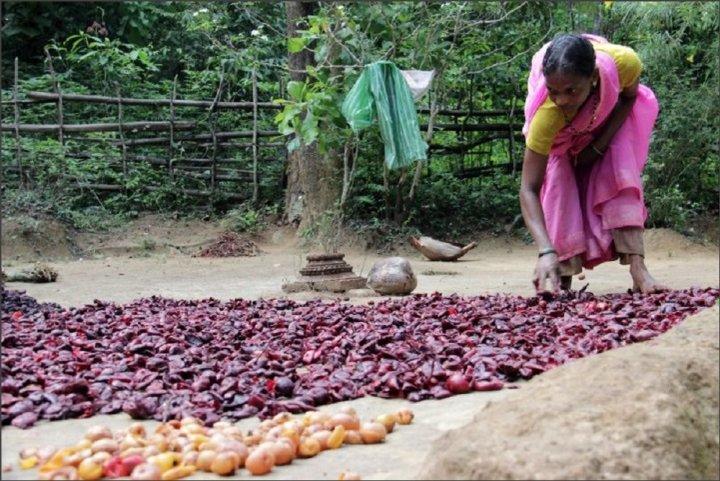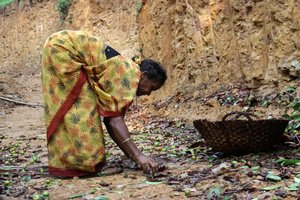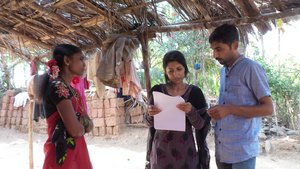Piloting a gender-responsive tool for assessing the poverty impacts of value chain development

Last month, field researchers from three parts of India participated in a training workshop on a new gender-responsive methodology for assessing the poverty impacts of value chain development – 5Caps-G. Three Bioversity International scientists report back.
Last month, field researchers from three parts of India participated in a training workshop on a new gender-responsive methodology for assessing the poverty impacts of value chain development - 5Capitals-G. Dietmar Stoian, Principal Scientist, Value Chains and Private Sector Engagement, Gennifer Meldrum, Research Fellow, Nutrition and Marketing Diversity and Marlène Elias, Gender Specialist, Conservation and Management of Forest Genetic Resources explain more in this report.
Last month, field researchers from three parts of India participated in a training workshop on a new gender-responsive methodology for assessing the poverty impacts of value chain development. The methodology focuses on impacts at the level of both smallholder households and enterprises they are associated with by assessing household and business assets in the form of human, social, natural, physical and financial capital.
This 5Capitals-G methodology is being developed by Bioversity International in close collaboration with colleagues from the World Agroforestry Centre (ICRAF) and will be piloted this summer in India, Guatemala and Peru. The training session was held to help get the India team ready and to pre-test prototype tools for context analysis and the household and enterprise assessments.
 The training was held in Karnataka, where students from the College of Forestry (Sirsi) will be testing the 5Capitals-G tool to study the value chains of three forest-gathered fruit species: Garcinia indica (kokum), Mangifera indica (mango), and Garcinia gummi-gutta (brindleberry).
The training was held in Karnataka, where students from the College of Forestry (Sirsi) will be testing the 5Capitals-G tool to study the value chains of three forest-gathered fruit species: Garcinia indica (kokum), Mangifera indica (mango), and Garcinia gummi-gutta (brindleberry).
The workshop started by laying the conceptual foundation of an asset-based approach to value chain development and the importance of applying a gender lens to identify the access to and control over assets that differs between women and men. The participants then headed to the field to pre-test the prototype tools for final refinement. Since the group included many students, the training provided a first experience for many in conducting key informant, household and enterprise interviews.
The participants visited ‘Kadamba’, a farmers’ cooperative society in Sirsi with more than 2,000 members from across Karnataka. They interviewed the CEO and several employees, including both men and women. They were impressed to learn that the cooperative provides diverse income-earning opportunities for rural men and women by purchasing close to 30 agricultural and forest products cultivated or collected by their members. One of the products they buy is kokum, which they process into fresh juices and powered juice crystals. Participants also met with leaders of three Village Forest Committees who explained how they manage sustainability issues linked with the collection and commercialization of forest products.
 For the household assessments, participants met with women and men smallholders in their homes to understand their experiences with marketing kokum and the ways their involvement in the kokum value chain ties in with the many other activities they pursue to make a living. Participants grouped into mixed teams of men and women interviewers to first interview the male and female households jointly. Then the women interviewers continued with the female respondents and the male interviewers with the male respondents to appreciate differences in the perspectives and realities of women and men. Some of them were surprised to learn how man and woman of the same household may differ in their perception of who makes decisions on what and to what degree decisions may be taken jointly.
For the household assessments, participants met with women and men smallholders in their homes to understand their experiences with marketing kokum and the ways their involvement in the kokum value chain ties in with the many other activities they pursue to make a living. Participants grouped into mixed teams of men and women interviewers to first interview the male and female households jointly. Then the women interviewers continued with the female respondents and the male interviewers with the male respondents to appreciate differences in the perspectives and realities of women and men. Some of them were surprised to learn how man and woman of the same household may differ in their perception of who makes decisions on what and to what degree decisions may be taken jointly.
On the last day, the participants reflected on their experiences and concluded that it is critical to account for diverse, and at times conflicting, views and needs of women and men in both the households and smallholder enterprises. They also agreed that the design and monitoring of value chain interventions requires specific engagement with both men and women to ensure that both benefit form value chain development in an equitable way. Practical tips were exchanged with regard to the complex household structures and situations that will be faced when engaging in full-fledged tool testing over the coming months.
Shambhavi Priyam, a young researcher working with Action for Social Advancement in Madhya Pradesh reflected that “it was amazing to see the nitty-gritties which have to be considered when designing a tool with gender consideration. There is no 'one size fits all' system for social research”. The introduction of young researchers in India and elsewhere to the concepts of gender-responsive research in relation to value chain development will allow them to increase the depth of their work and their capacity to develop gender-equitable solutions for eliminating poverty.
For more information, contact:
Dietmar Stoian, Principal Scientist, Value Chains and Private Sector Engagement
Related news:
5Capitals-G – Piloting a gender-responsive methodology for assessing the poverty impacts of value chain development (ICRAF website)
Engendering data
This training was implemented as part of the project 'Innovations in Ecosystem Management and Conservation (IEMaC)' with support from the CGIAR Research Program on Policies, Institutions and Markets (PIM). The IEMaC project is funded by the InFoRM (Innovations in Forest Resource Management) program of USAID, which aims to reduce forest degradation in India, with co-funding from the CGIAR Research Program on Forests, Trees and Agroforestry (FTA). Participants in the workshop also included partners of the project 'Linking agrobiodiversity value chains, climate adaptation and nutrition: Empowering the poor to manage risk' that is supported by IFAD, the European Union and the CGIAR Research Program of Climate Change Agriculture and Food Security (CCAFS) promoting value chain development of minor millets.
Photos:Top: Drying kokum fruit in the sun before they are made into other products. The rinds are used to make beverages and slimming products. Credit: Bioversity International/E.Hermanowicz
Middle: Yenki Siddhi, has been collecting kokum fruits (Garcinia indica) from the forest near her village since a child. Credit: Bioversity International/E.Hermanowicz
Bottom: Students interviewing a female head of household. Credit: Bioversity International/G. Meldrum
